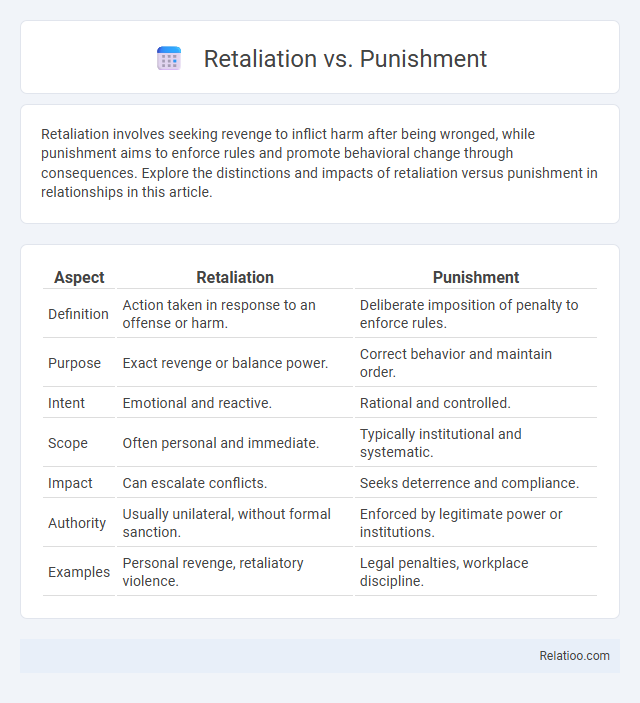Retaliation involves seeking revenge to inflict harm after being wronged, while punishment aims to enforce rules and promote behavioral change through consequences. Explore the distinctions and impacts of retaliation versus punishment in relationships in this article.
Table of Comparison
| Aspect | Retaliation | Punishment |
|---|---|---|
| Definition | Action taken in response to an offense or harm. | Deliberate imposition of penalty to enforce rules. |
| Purpose | Exact revenge or balance power. | Correct behavior and maintain order. |
| Intent | Emotional and reactive. | Rational and controlled. |
| Scope | Often personal and immediate. | Typically institutional and systematic. |
| Impact | Can escalate conflicts. | Seeks deterrence and compliance. |
| Authority | Usually unilateral, without formal sanction. | Enforced by legitimate power or institutions. |
| Examples | Personal revenge, retaliatory violence. | Legal penalties, workplace discipline. |
Understanding Retaliation: Definition and Context
Retaliation involves responding to an offense or harmful action with a similar or equivalent act, often driven by a desire for revenge rather than justice. Punishment, in contrast, is a structured and intentional consequence imposed to correct or deter undesirable behavior within legal, disciplinary, or social frameworks. Understanding retaliation requires recognizing its emotional basis and informal nature, which differentiates it from the formal and regulated objectives of punishment.
Punishment: Meaning and Historical Perspectives
Punishment refers to the imposition of a penalty or sanction in response to an offense, aiming to deter undesirable behavior and maintain social order. Historically, punishment has evolved from harsh physical penalties in ancient legal codes, such as Hammurabi's Code, to more rehabilitative and restorative justice approaches in modern legal systems. Understanding punishment's role in your societal context reveals its impact on justice, morality, and behavior regulation across different cultures and epochs.
Key Differences Between Retaliation and Punishment
Retaliation involves an immediate, often emotional response to perceived harm, aiming to inflict similar damage, whereas punishment is a deliberate, structured consequence designed to enforce rules or laws. Retaliation lacks formal authority and is typically reactive, while punishment is administered by an authorized entity following due process. Understanding these distinctions is crucial for addressing conflicts effectively and ensuring justice systems function properly.
Psychological Motivations Behind Retaliation
Retaliation stems from psychological motivations such as perceived injustice, desire for retribution, and emotional arousal triggered by hurt or anger, distinguishing it from punishment, which is often a structured response aimed at behavior correction or deterrence. Your urge to retaliate can be driven by the need to restore self-esteem and balance after feeling wronged, highlighting a deeply personal and emotional response rather than an objective enforcement of rules. Understanding these psychological factors clarifies why retaliation tends to be impulsive and emotionally charged, contrasting with the calculated nature of punishment.
Purposes and Justifications of Punishment
Punishment serves to deter wrongful behavior and uphold social order by imposing consequences aligned with the offense, whereas retaliation seeks revenge without a focus on justice or reform. The purpose of punishment is to provide a just and proportional response that emphasizes accountability, rehabilitation, and deterrence, ensuring fairness within the legal system. Understanding the distinction helps you recognize that punishment is justified through legal and ethical frameworks aimed at correcting behavior, unlike retaliation, which often fuels cycles of conflict.
Social and Legal Implications of Retaliation
Retaliation involves harmful actions taken in response to perceived wrongs, often leading to escalating conflicts and social discord. Unlike punishment, which is a structured, legal consequence imposed by authorities to enforce rules, retaliation bypasses formal processes and can undermine the rule of law, exposing Your rights to violation and potential abuse. Socially, retaliation fosters cycles of resentment and mistrust, while legally, it risks criminal liability and civil penalties for actions outside authorized enforcement.
Ethical Considerations in Punishment Practices
Ethical considerations in punishment practices emphasize fairness, proportionality, and respect for human dignity to avoid excessive or wrongful harm. Unlike retaliation, which often involves emotional and disproportionate responses, ethical punishment seeks to uphold justice through due process and rehabilitation. Ensuring transparency and accountability in punitive measures helps maintain trust in legal and institutional systems.
Effects of Retaliation and Punishment on Individuals
Retaliation often escalates conflict by triggering negative emotions such as anger and fear, which can damage relationships and reduce trust in both personal and professional environments. Punishment may lead to compliance but frequently results in resentment, decreased motivation, and impaired mental health, particularly when perceived as unfair or excessive. Understanding how your responses impact others is crucial for fostering a positive environment, as retaliation tends to perpetuate hostility while well-structured punishment aims to correct behavior without causing long-term harm.
Retaliation vs Punishment in Workplace Environments
Retaliation in workplace environments refers to adverse actions taken against an employee for engaging in protected activities, such as reporting discrimination or harassment, whereas punishment typically involves disciplinary measures for performance or behavior issues unrelated to protected actions. You should understand that retaliation is illegal and can lead to severe legal consequences for employers, while punishment is a legitimate management tool when applied fairly and consistently. Distinguishing between these concepts is crucial for maintaining a lawful, respectful workplace culture.
Building Healthier Responses: Alternatives to Retaliation and Punishment
Building healthier responses involves shifting focus from retaliation and punishment towards constructive conflict resolution strategies such as active listening, empathy, and collaborative problem-solving. Incorporating restorative justice practices fosters accountability and healing by addressing underlying issues instead of perpetuating cycles of harm. Emphasizing emotional regulation and communication skills empowers individuals to respond adaptively, promoting long-term relationship resilience and psychological well-being.

Infographic: Retaliation vs Punishment
 relatioo.com
relatioo.com